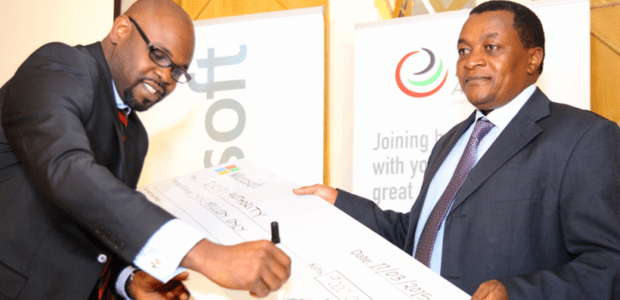advertisement
South Sudan, Somali to participate in Connected East Africa Summit
The inaugural Connected East Africa Summit is set to attract delegates from South Sudan and Somali. This was announced by…

The inaugural Connected East Africa Summit is set to attract delegates from South Sudan and Somali.
This was announced by Eng Victor Kyalo, CEO, ICT Authority who said that the move to have delegates from the two countries on board is also meant to improve the East Africa Customs Union and further enhance an integrated community that can be achieved by all the East African nations coming together.
Connected East Africa Summit is set to run from March 30 to April 2, 2015 at the Leisure Lodge Golf and Resort in Kwale County.
advertisement
Running for seven years now, the summit offers a platform in which top ICT executives from government, academia and private sector share and exchange ideas on how to use ICT as a catalyst to service delivery to citizens. This year, participants will also be drawn Kenya, Uganda, Burundi and Rwanda.
“ICT continues to play a major role in the economic, political, social and cultural development of our country. Technology has increased efficiency, transparency and is cutting costs whether in start-ups, Multi-nationals or government. We are now widening the market to cover more than 150,000 million residents in the region,” Mr Victor Kyalo, ICT Authority Chief Executive Officer, said.
Mr Kyalo, added that integration will be an answer to the region growing economies that get caught up between investing in basic amenities for the citizens or to marshal funds for ICT infrastructure. Often, because of pressing needs for limited resources, ICT is pushed to the back banner.
advertisement
Themed as the ‘strength is in our networks’ the summit takes cognizant of the region’s achievements and appreciates the growing needs of an enlarged community. This year’s Connected East Africa will commence discussions on how the region can leverage on ICT for full realization of the benefits of the Customs Union (2005) and Common Market (2010) protocols by its’ regional citizens.
This year’s title sponsor is Microsoft with a sponsorship of Kshs 9 million followed by Liquid Telecom with Kshs 2.5 million. Others sponsors are SEACOM, Dimension Data, Huawei, Konza Techno City and HP.
According to Microsoft Kenya Country Manager Mr Kunle Awosika. “Connected East Africa will be the platform where stakeholders in the sector will address gaps in the integration of shared infrastructure as well as speed up the harmonization of ICT regulation across the region.”
advertisement
Mr Awosika added that Microsoft is fully dedicated to empowering innovations and skills in the regional’s ICT sector through various programs.
“Importantly, last year December we launched CITYNEXT, a people-first approach to innovation that empowers governments, businesses and citizens to shape the future of their cities,” he added.
Already the bloc has embarked on a number of collaborative projects namely; East Africa Broadband ICT Infrastructure Network (EAC-BIN); LAPPSET Northern Corridor Project as well as EAC Medicine Registration Harmonisation project.
On policies, member states are working on EAC legal framework for Cyber laws and ICT policy & Harmonisation framework.
The expansion of the event from Kenya to the East Africa region was borne out of Connected Kenya 2014 Conference, in which East Africa Ministers took part.
The regional conference will address issues of building an integrated ICT infrastructure in the region. The East Africa countries have formed an inter-ministerial committee which looks into breaking regional barriers in harmonisation of ICT.
The Connected Kenya Summit, first held in 2009, aims at establishing a platform for collaboration, capacity building and knowledge sharing between government and the ICT sector with a view of linking and hastening implementation of government IT projects to world-class standards.
Some of today’s leading government projects have links with Connected Kenya. With its remarkable mix of decision-makers from government and leading ICT thinkers from industry, the Summit has enabled its participants to develop unique insights that allow them to successfully respond and design their engagement in Kenya’s vibrant ICT sector. Projects such as Kenya Open Data Initiative, Huduma citizen’s portal and the development of a national Information Security Policy were informed or refined from discussions and panels held at Connected Kenya.